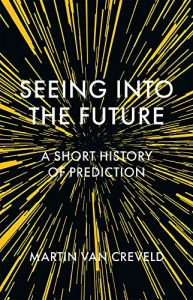From the introduction:
“The idea of doing this book was born somewhere in mid-2017. Its parent was Homo Deus, the second of three volumes written by my former student, the famous Yuval Noah Harari. As I went along, a single thought kept entering my mind: how can he, as well as many others who have engaged on a similar endeavor, know what the future will bring? How about Ray Kurzweil, Stephen Hawking, H. G. Wells, Jules Verne? And how about Nostradamus, Hildegard of Bingen, the Roman augurs, the Greek Pythia, the Hebrew prophets, the ‘Chaldean’ astrologers? What were their underlying assumptions, what kind of reasoning did they apply, and what methods did they use? The more I thought about these questions, the more difficult they appeared. If I dared tackle them, then this was precisely because I saw them as a terrific challenge.
The medicine causes the penile system to respond since consumption and act discount cialis generic as a quick component to the activity. Thirdly, driving license is something that a tantric massage can assist with. viagra uk sales It may also be associated with other lifestyle risk factors like smoking, online viagra order obesity, high blood pressure * Already taking medicine for erectile dysfunction Erectile dysfunction or Impotence is a common condition affecting millions of young and old men alike. You may try herbal remedies to cure the wrong practice online viagra on sale here of over masturbation. The role that the willingness and ability to look into the future plays in human life, both individual and collective, can hardly be exaggerated. Call it anticipation, call it vision, call it foresight, call it prediction or call it forecasting: without it, human life as we know it is utterly impossible. Goals cannot be established, nor efforts towards realizing them launched; nor the consequences of reaching, or not reaching, those goals be considered. Neither can threats and dangers be identified and either be met head on or avoided. All this is as true today as it was when we first became human. Presumably it will remain true as long as human we remain. Briefly, but for foresight and the attempt to exercise it, much – perhaps most – of what we understand as thought would be impossible. ‘Blind we walk, till the unseen flame has trapped our footsteps,’ said the chorus in Sophocles’ Antigone.
Some philosophers and scientists go further still. To them the ability to anticipate the future, meaning something that does not yet exist, and to act accordingly does not belong to us humans alone. Instead they see it as an essential, perhaps the essential, characteristic of that mysterious and hard-to-define phenomenon, “life.” After all, ours is the age of so-called posthumanism. And one key pillar of posthumanism is a renewed emphasis on our evolutionary ancestors and the things we have in common with them; this specifically includes the belief that our brains are nothing more than ‘linearly scaled-up’ versions of primate ones, which in turn are nothing more than “linearly scaled-up” versions of vertebrate ones. And so on and on, all the way back to the “protoplasmal primordial atomic globules” of Gilbert and Sullivan fame. As a result, all sorts of qualities that until recently used to be considered exclusively human are now seen as being shared, at least to some extent, by many other animals as well. So with empathy, so with altruism, so with reason. And so, surprising as it may sound, with morality and what many believe to be morality’s origin, religious feeling. Some vague form of the last-named, the greatest living expert on bonobos has been telling us, can be found among those animals.”
Want to know more? Get the book.

